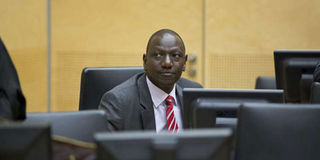Hague court allows AU to file submissions in Ruto appeal case

Mr William Ruto at the International Criminal Court on September 10, 2013. The ICC has given the African Union a week to file submissions on the application of a contentious rule to allow recanted evidence. FILE PHOTO | NATION MEDIA GROUP
What you need to know:
- The contentious Rule 68 was used to allow recanted evidence in the case facing Deputy President William Ruto at The Hague.
- Judge Hofmanski was satisfied that the application by the AU to make written submissions, as a friend of the court in the case facing Mr Ruto and former journalist Joshua arap Sang, would be helpful.
- The judge noted the submissions would help the Appeals Chamber determine whether Trial Chamber judges were applying the rule in line with the Rules of Procedure and Evidence governing the ICC.
The International Criminal Court (ICC) has given the African Union a week to file submissions on the application of a contentious rule to allow recanted evidence.
The contentious Rule 68 was used to allow recanted evidence in the case facing Deputy President William Ruto in The Hague.
In the same ruling, however, ICC Appeals Chamber Presiding Judge Piotr Hofmanski rejected the bid by Kenya, Uganda and Namibia.
The three countries had sought to make written submissions on how the Trial Chamber has been applying Rule 68, something that has triggered an outcry among African Union (AU) members.
Judge Hofmanski was satisfied that the application by the AU to make written submissions, as a friend of the court in the case facing Mr Ruto and former journalist Joshua arap Sang, would be helpful.
The judge noted the submissions would help the Appeals Chamber determine whether Trial Chamber judges were applying the rule in line with the Rules of Procedure and Evidence governing the ICC.
“The Appeals Chamber finds that the observations the African Union wishes to make may be desirable for the proper determination of the first issue on appeal, namely, whether the amended Rule 68 of the Rules of Procedure and Evidence can be applied in the instant case without offending articles 24 (2) and 51 (4) of the Statute,” he said.
He promised that in the final ruling on Mr Ruto’s appeal the chamber would take into consideration the views of the continental body.
“The Appeals Chamber notes that the receipt of the proposed observations is without prejudice to the weight, if any, to be accorded to them in the determination of this appeal,” he stated.
Mr Ruto is contesting the decision by the Trial Chamber to allow Prosecutor Fatou Bensouda to use recanted testimonies of hostile witnesses.
DIRECTION OF THE CASE
The AU Commission submitted an application to make submissions following instructions by the union’s Heads of State and Government Summit.
The AU Commission’s application followed concern about the direction the Ruto case was taking.
They accused Trial Chamber judges Chile Eboe-Osuji, Robert Fremr and Geoffrey Henderson of applying Rule 68 contrary to the spirit of the amendments that were agreed upon during the Assembly of States Parties (ASP) meeting in 2013.
They have demanded that the application of the rule be reviewed during next month’s ASP meeting to ensure that it is not applied retroactively.
Kenya, Uganda and Namibia submitted similar applications, arguing that their submissions would assist the Appeals Chamber to make the correct decision.
Uganda’s Attorney-General Frederick Ruhindi argued that state parties, which presided over the amendment to Rule 68, were in a better position to explain what was agreed upon during the ASP.
“To disavow the understanding of the negotiators of this rule as immaterial would be to render impotent a critical legislative organ of the Rome Statute and frustrate the legislative intention of the Rule as amended,” he said.
Namibia’s Attorney-General Sakeus Shanghala submitted that they wanted to give the court information that would help in the determination of the case.
Attorney-General Githu Muigai had made his submissions a month earlier, prompting protests from Ms Bensouda.
But on Monday, Judge Hofmanski threw out their applications, arguing that the AU was representing all member states, including Kenya, Uganda and Namibia.
“The Appeals Chamber considers that the submissions that Kenya, Uganda and Namibia seek to make in relation to the first issue certified on appeal would be duplicative of those that the African Union seeks to make,” he said.




